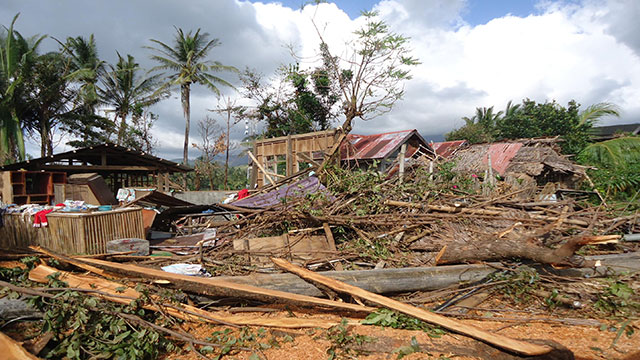SUMMARY
This is AI generated summarization, which may have errors. For context, always refer to the full article.

ANTIQUE, Philippines – Sixteen months after one of the world’s strongest typhoons devastated the Philippines, many of the affected provinces are still struggling to recover.
The northern towns of the provinces of Iloilo and Antique and several municipalities in Capiz and Aklan were greatly damaged with hundreds of families still displaced and merely dependent on government and foreign aid.
However, several municipalities and communities directly in the path of the killer typhoon Yolanda (Haiyan) were able to report zero loss of life and minimized damages on property and agriculture.
In Antique, the towns Barbaza and Tibiao, which were the two severely hit municipalities, attributed this to the early preparedness of the people through the efforts of their disaster management offices.
SURGE launched
Aiming to increase resilience of high-risk communities in the Philippines, civil society groups in Western Visayas formed the regional Scaling-up Resilience in Governance (SURGE) project in February at the UPV Iloilo City campus.
SURGE extends inclusive community-based disaster risk reduction (ICBDRR) to more communities and advocates improvements in disaster risk management policies and practices.
There were a lot of good models and practices on ICBDRR implemented in many communities and barangays all over the country over the years.
SURGE will be bringing these successful experiences to more communities to improve and scale up good practices in the provincial, regional, and national agencies.
“SURGE doesn’t have a component on post-disaster but it hopes to make communities better prepared to respond to that,” said Alvic Padilla of Christian Aid.
This project also seeks the improvement of DRR institutions to higher levels to make them more supportive of the promotion and replication of model ICBDRR practices in more communities.
SURGE is a consortium of 4 international development agencies that have been active in humanitarian efforts in the Philippines for several years now – Christian Aid, Handicap International, Oxfam and Plan International. The project is supported by the European Union humanitarian aid
Besides Region 6, SURGE activities are similarly implemented in 5 other regions: NCR (Metro Manila), Region V (Bicol), Region VIII (Eastern Visayas), Region XI (Davao), and Region XIII (CARAGA).
Change in climate change policy
SURGE also lobbies for improvements in disaster risk management policies and practices by using evidence from experience.
It spreads the learnings from the successful experiences of communities that integrated ICBDRR in their policies and practices and as a result, reduced losses of lives, property, and opportunities.
SURGE aspires to develop the resilience of individuals who have been marginalized and rendered vulnerable through inclusive community-based disaster risk reduction management or one that is non-discriminatory, supported by responsive policies and adequate resources and implemented with the meaningful participation of all.
The 4 organizations will also be participating in the “sunset review” of Republic Act 10121 or the Philippine Disaster Risk Reduction Management Act of 2010.
This project is implemented through a series of activities like community-building, policy advocacy, training, and creative communications with diverse stakeholders over 18 months, from March 2014 to June 2015. It will benefit national DRR agencies, LGUs and affected communities in high-risk and poor areas in the country.
LGUs and affected communities, DRR practitioners including the civil society organizations and DRR champions will benefit from a series of peer-to-peer and mentoring sessions on ICBDRR.
The greater public can also learn more and influence others about the value of ICBDRR especially in a disaster-prone country like the Philippines through this project.
Although SURGE cannot fund any LGU or CSO initiative, it is open to working with different stakeholders on its planned activities and to exploring partnerships.
“In our experience during Typhoon Yolanda, we really need more partners to advance DRRM in saving lives and minimizing damage to properties,” said Ma. Aletha Nogra of the Office of Civil Defense (OCD) Region VI. – Rappler.com
(The writer is a volunteer for the Typhoon Yolanda Story Hub Visayas, a citizen journalism portal created on Nov 13, 2013, by veteran journalists, student writers, mobile journalists, and photographers based in Iloilo City. The Hub delivers reports from across Panay Island, especially the severely damaged and minimally covered northern Iloilo area and the provinces of Antique, Capiz, and Aklan.)
Add a comment
How does this make you feel?
There are no comments yet. Add your comment to start the conversation.